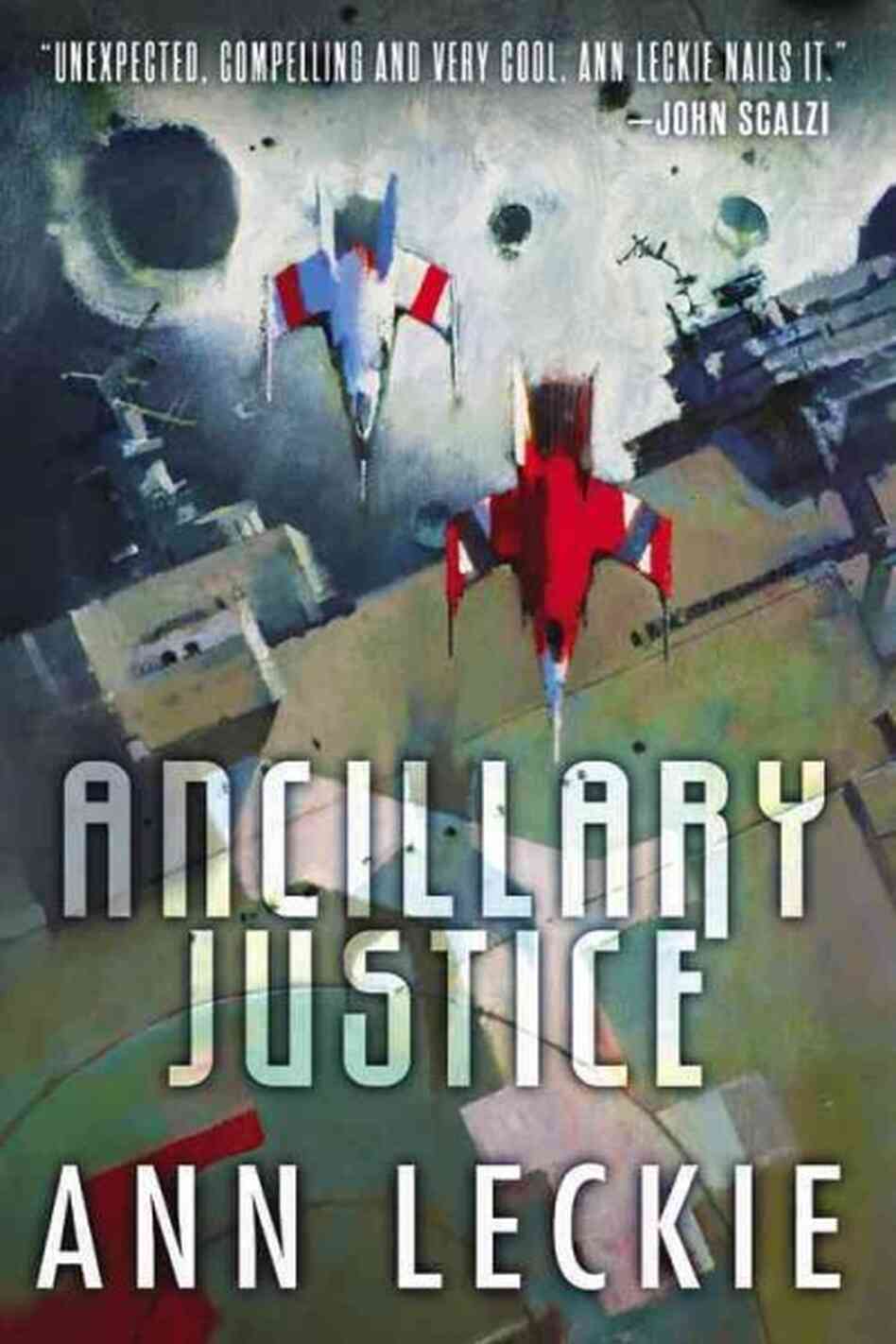Book Review: Ancillary Justice by Ann Leckie

Ancillary Justice is an awesome book. I know I’m not the only person with that opinion because it won a Nebula Award and an Arthur C. Clarke Award. Instead of focusing much on the plot (although I will address the plot because it is good, too), I want to talk about what makes this novel interesting.
Justice of Toren One Esk Nineteen also known as Breq is an ancillary. Ancillaries are human bodies that belong to a space ship. Ancillaries are mentally networked with their ship. Essentially, they are people with AI (artificial intelligence). Large ships, like Justice of Toren of which Breq was an ancillary, have multiple crews of ancillaries who work together to take care of the ship and support the human crew.
The plot hinges on the concept that an AI occupying multiple bodies can have conflicting opinions. Even though the AI’s bodies are technically all the same person, none of them really individuals, they can fragment. Breq belongs to a group of ancillaries called One Esk. Among many other campaigns, One Esk serves planetside during the annexation of another culture by the dominant civilization, the Radch. Events on the planet make One Esk realize that she does, perhaps, have the ability to hold internally conflicting opinions. Later, One Esk Nineteen is isolated from One Esk and Justice of Toren and she must adapt to acting individually.
That is the barest introduction to the story. I like the way AI works in this novel. Holding it together is the ancillary system, whose brutality is barely acknowledged by the Radchaai people. Radchaai seem to find it inappropriate to discuss what ancillaries are, insisting that they are not people, but equipment, part of the ship. Ancillaries used to be people themselves. It seems that most of the bodies ancillaries inhabit were formerly those of enemy combatants or citizens of the Radch who did not fit well into the social order. The origin of the ancillaries is not much discussed, but it does seem like the sort of horror that may be exposed in the series’ next book.
A lot of aspects of Radchaai civilization (this is a redundant phrase since in Radchaai, Radchaai means “civilized”), are like that: intensely brutal, but people work hard to ignore the brutality. The Radchaai people are relentless in annexing as many other civilizations as possible. The novel eventually reveals that the Radch are so focused on annexation because annexation drives the whole economy and the system of wealth acquisition for prominent families.
I appreciate the social structure in the Radch and the detail apparent in the way the culture works. It was different enough that it had a feeling of otherness, but many of the concepts were recognizable. The Radchaai structure themselves into family Houses, with certain families being particularly wealthy and prominent. These Houses participate in a kind of patronage system, called clientage in the book. Houses with less influence can be “clients” of weather houses. Of course, this kind of system puts poor people at a disadvantage, as ever. People with influence can get better placements in the military and are assumed to just be better people. People of “low” birth are at a major disadvantage in this system.
The Radchaai demonstrate their civility through outward symbolism. No Radchaai would be caught dead without gloves, for example. I like the idea of gloves as a marker of civilization, personally. They also make public displays of worship in temples, exchange pins and jewels to affix on their uniforms, and drink tea (like all civilized people in every era, clearly).

Ancillary Justice made me think about how I perceive gender when reading. In the Radchaai language, there is no gender binary. Everyone refers to others as “she.” Children are automatically daughters. Women are simply people. There are both men and women, of course, but the civilized Radchaai tongue does not acknowledge them as different. Neither are there explicit performative actions for femininity and masculinity; anyone can present themselves in any (socially acceptable) way. Gender presentation is not tied to propriety. When the protagonist is on a backwater world, she has to use the local language, which includes referring to people with the correct gender pronouns. Our protagonist, as an AI and former part of a ship, finds it difficult to distinguish male from female and she is at constant risk of offending others.
This un-gendering of everyone is awesome. I did not realize how strongly ingrained it was for me to see male as the default. When the author introduced a new character, I considered him to be male. There are a few biases here that made me assume everyone was male: this is a militaristic civilization (many of the main characters are lieutenants, captains, etc.) and much of the story takes place on space ships, which are also stereotypically a male thing. But when a character inevitably referred to other characters as “she,” my brain did a double take. I didn’t even realize I was imagining characters as male until I was confronted with the female pronoun. Of course, the way the novel is set up, any character could be a man (technically speaking), but that person is still referred to as a woman, and that is the civilized thing to do.
I applaud Leckie for writing a civilization that treats gender this way. Seeing how gender can be irrelevant is fascinating. Even though I am educated about many gender-related issues, I still have this male-default bias. I didn’t even know I was doing it. I hope to see more books that play with gender so skillfully. Ancillary Justice challenged assumptions I did not know I had.
What to read next:
-
It is not being released until October, but obviously my suggestions include the next book in the Imperial Radch series, Ancillary Sword. You have four months to catch up. Get on it!
-
Want to read more about artificial intelligence (I do!). Try Our Final Invention by James Barrat. This is a non-fiction book about the coming-soon technologies leading to AI.
-
Somewhat unrelated, but I read this recently and liked it: Lexicon: A Novel by Max Barry. This novel does not challenge the linguistics of gender like Ancillary Justice does, but language and how it is used drives the plot. It was an interesting read and I recommend it.